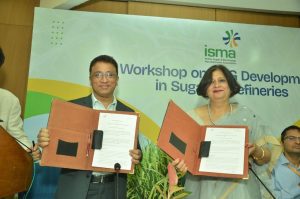The Indian Sugar & Bio Energy Manufacturers Association (ISMA), signed Memorandum of Understanding (MOUs) with The Energy and Resources Institute (TERI) and PRAJ Industries to advance sustainable bioenergy solutions, focusing on Sustainable Aviation Fuel (SAF) as well as exploring the potential of Bio-Ethanol, Bio-Gas, Green Bio-Hydrogen, and Green Methanol. Aimed at building a bio-economy and low-carbon energy infrastructure in India, this collaboration will play an integral role in promoting knowledge sharing, policy advocacy, and capacity building for these industry-government partnerships.
As per press release, the latest collaboration will create an enabling environment for SAF production and deployment, aligning with the government’s sustainability goals. Given the increasing carbon footprint of the aviation industry every year, ISMA’s MOUs serve as a bedrock for advancing India’s efforts in the adoption of bioenergy solutions like SAF. It will further catalyse the country’s commitment to meeting the requirement of blending 1% SAF with Aviation Turbine Fuel by 2027 and 5% by 2030 under the CORSIA mandates of the International Civil Aviation Organisation (ICAO) which are slated to kickstart in 2027 with its 2nd voluntary pilot phase already in progress (2024-26).

Deepak Ballani, Director General of the Indian Sugar & Bio-Energy Manufacturers Association (ISMA), said, “Today is a big day for us in our journey to promote sustainable energy solutions for the aviation industry. The MOUs with TERI and PRAJ Industries are not just a collaboration but an alignment with our vision of a greener tomorrow. Unlike conventional jet fuels, SAF produced from renewable resources can significantly reduce greenhouse gas emissions which remains one of the biggest challenges. By virtue of our collaboration, we will leverage the research and policy expertise of TERI and the technology solutions of PRAJ to negate such challenges and build a robust bioenergy ecosystem.”
“At ISMA, we remain committed to leading initiatives that focus on collaboration, capacity building, and knowledge sharing to drive sustainable growth in both agriculture and bioenergy sectors. Together, we are positioning India as a global leader in the production of bioenergy, while addressing both environmental and economic needs,” he further added.

The aviation industry accounts for 3% of global carbon emissions, nearly 1 billion metric tonnes every year. With the sector’s growing contribution to carbon footprint, the need for an alternative to traditional jet fuel becomes more pressing.
When it comes to SAF, the country can once again resort to the sugarcane industry, specifically bagasse, which is an ideal feedstock due to its abundant availability, reduced Green House Gas emissions and cost-effective technological feasibility.
ISMA’s latest collaboration is a testament to its persistent efforts in helping India realise its bio-energy and sustainability goals by leveraging the capabilities of the sugarcane industry.












